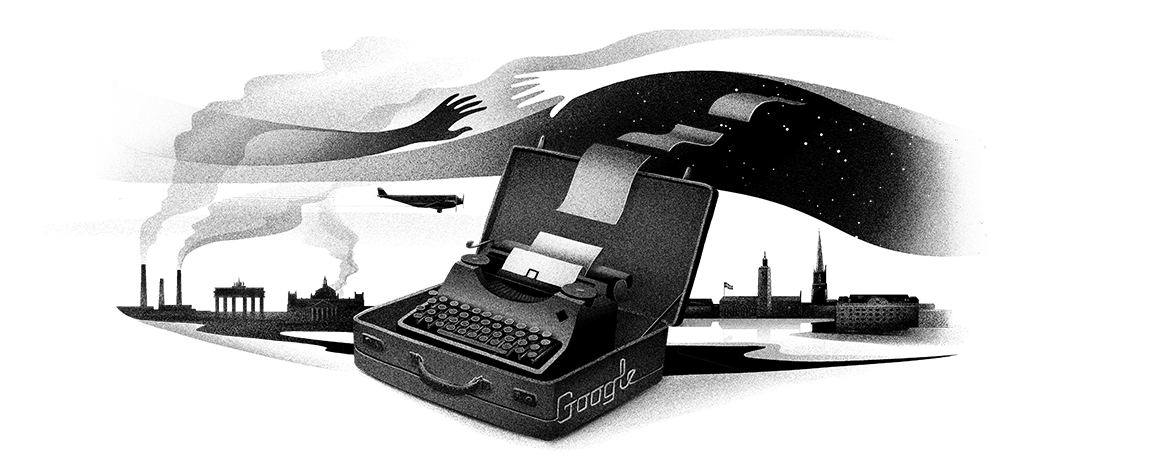Hello
Gentle Reader
If
you are a resident of the United Kingdom, Germany, Bulgaria, Israel, Sweden or
the United States of America, you would have seen a doodle on Google, commemorating
Nelly Sachs’ 127th birthday.
The
illustration (which is displayed below) was designed and drawn by the German-Finnish
artist Daniel Stolle. This doodle can also be found on the Google Doodles—Nelly Sach - Google Doodle Archive
[Please follow the yellow link noted above - it will also lead you to see earlier compositions as well as the finished product. Each one magnificent.]
The
illustration perfectly captures the works of Nelly Sach:
The
type writer in the suitcase, displaying both her talents and occupation as a
writer, and the fact she and her mother fled Germany during the opening of the
Second World War, as they were Jewish. The pages of the type writer fling and
fly forward into a starry sky. In the sky to hands seek each out, over a
landscape reflecting of Sachs’ life, Berlin on fire due to the war. The chimneys
of the concentration camps. The sanctuary of Stockholm, Sweden.
A
few notes on Nelly Sachs’ life:
Sach
was born December 10th, 1891. She was born into a wealthy
Jewish-German family during this time, and showed a proclivity for literary pursuits
early on. She found mild success in the 1920’s as a writer, when her work was
featured in a few magazines. Despite growing up in a wealthy upper-middle class
family, Nelly Sachs’ childhood was regarded as being alienating and lonely; but
she developed a great correspondence with fellow writers which included, Paul
Celan (who she once affectionately referred to as ‘brother,’) and the Swedish
author, Nobel Laureate and member of the Swedish Academy Selma Lagerlöf.
It
was thanks to her correspondence with Selma Lagerlöf that Sach and her mother
were able to flee Germany during the rise of Nazism and anti-Semitism, and take
refuge in Sweden. There Sach supported her mother and herself by translating
works from Swedish into German, and her poetry began to mature and change its
perspective, though not without considerable strain both mentally and
emotionally.
Nelly
Sachs’ poems are noted for their discussion of the fate of the Jewish people
during the holocaust. Though her poems are noted for their elegiac tone and
their preoccupation with remembering those who were lost, they also express forgiveness
and metamorphosis, as well as freedom from suffering, pain, and the horrors of
the time. She was often considered a striking paradox of poet, a frail almost
bird like woman who had the powerful lung capacity to shake the walls with her
verse.
Nelly
Sach is also a Nobel Laureate in Literature, specifically 1966, though she
shared the award with the then renowned Hebrew writer, Shmuel Yosef Agnon. The
Swedish Academy hotly debated the merits of Sach (she had a relatively small
output of work—but a powerful one) her work had gained the recognition and
support of also prominent members of the Swedish Academy, who continually
advocated for her work. Opposition though was not lacking. Some members (though
mainly Anders Österling) felt she could not support the entire Nobel Prize for
Literature on her own; not surprising Österling was a greater fan of Shmuel
Yosef Agnon.
Before
she won the Nobel Prize for Literature, Sach won the Peace Prize of the German
Book Trade. Upon receiving the award she stated: “I believe in you.”—Perhaps meaning
Germany’s desire to never commit the atrocities that had been perpetrated years
prior.
Despite being known as a poet of
mourning, of remembrance and the penance of memory, of elegizing the suffering,
and immortalizing those who had suffered; Sachs’ is also a poet of forgiveness and
metamorphosis.
In her Nobel acceptance speech she
recounted how her father would state, on the tenth of December in her hometown of
Berlin: “Now they celebrate the Nobel ceremony in Stockholm.”
Today the Nobel Ceremonies will take
place. Unfortunately no Literature prize will be handed out this year. Thankfully
to googles doodle though, those fortunate enough will be able to reconsider and
reflect on perhaps one of the most overlooked poets of the twentieth century:
Nelly Sach—who on this day fifty-two years ago: “a fairytale has come true.”
If one final note should be made about
the doodle it is this: it is artfully done, capturing Sachs’ preoccupations with
writing and the suffering caused by the holocaust; but most importantly the ability
of the human spirit to change and become something new, and the ever powerful
process of forgiveness.
Thank-you For Reading Gentle Reader
Take Care
And As Always
Stay Well Read
M. Mary
 |
| All Rights to Daniel Stolle |

No comments:
Post a Comment